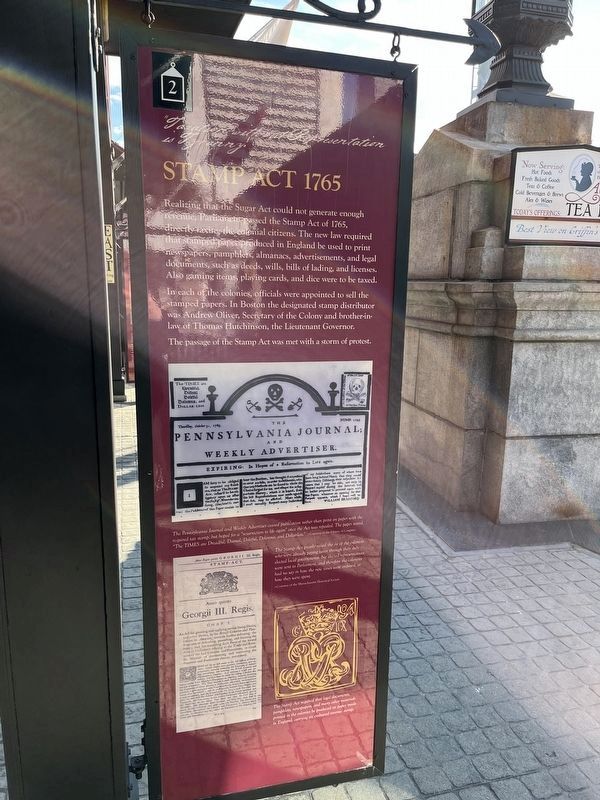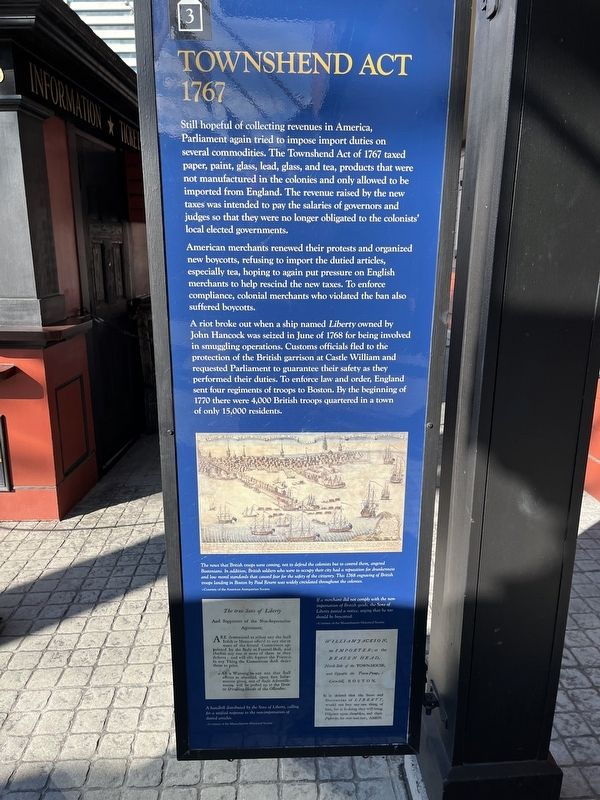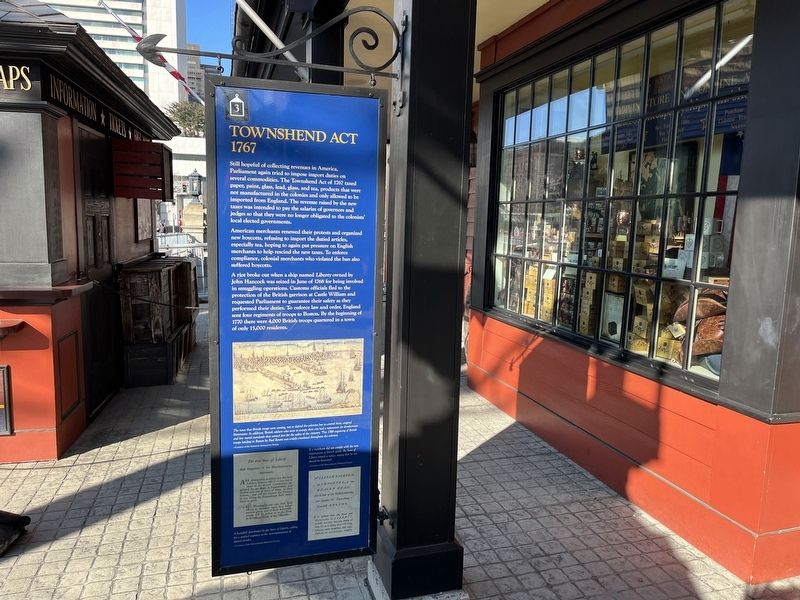D Street / West Broadway in Boston in Suffolk County, Massachusetts — The American Northeast (New England)
Stamp Act 1765 / Townshend Act 1767
Stamp Act 1765
"Taxation without Representation is Tyranny!"
Realizing that the Sugar Act could not generate enough revenue, Parliament passed the Stamp Act of 1765, directly taxing the colonial citizens. The new law required that stamped paper produced in England be used to print newspapers, pamphlets, almanacs, advertisements, and legal documents, such as deeds, wills, bills of lading and licenses. Also gaming items, playing cards, and dice were to be taxed.
In each of the colonies, officials were appointed to sell the stamped papers. In Boston the designated stamp distributor was Andrew Oliver, Secretary of the Colony and brother-in-law of Thomas Hutchinson, the Lieutenant Governor.
The passage of the Stamp Act was met with a storm of protest.
[Captions:]
The Pennsylvania Journal and Weekly Advertiser ceased publication rather than print on paper with the required tax stamp, but hoped for a "resurrection to live again" once the Act was repealed. The paper stated, "The Times are Dreadful, Dismal, Doleful, Dolorous, and Dollar-less."
The Stamp Act greatly raised the ire of the colonists who were already paying taxes through their duly elected governments. No elected representatives were sent to Parliament, and therefore the colonists had no say in how the new taxes were imposed or how they were spent.
The Stamp Act required that legal documents, pamphlets, newspapers, and many other materials printed in the colonies be produced on paper made in England, carrying an embossed revenue stamp.
Townshend Act 1767
Still hopeful of collecting revenues in America, Parliament again tried to impose import duties on several commodities. The Townshend Act of 1767 taxed paper, paint, glass, and tea, products that were not manufactured in the colonies and only allowed to be imported from England. The revenue raised by the new taxes was intended to pay the salaries of governors and judges so they were no longer obligated to colonists' local elected governments.
American merchants renewed their protests and organized new boycotts, refusing to import the dutied articles, especially tea, hoping to again put pressure on English merchants to help rescind the new taxes. To enforce compliance, colonial merchants who violated the ban also suffered boycotts.
A riot broke out when a ship named Liberty owned by John Hancock was seized in June of 1768 for being involved in smuggling operations. Customs officials fled to the protection of the British garrison at Castle William and requested Parliament to guarantee their safety as they performed their
[Captions:]
The news that British troops were coming, not to defend the colonists but to control them, angered Bostonians. In addition, British soldiers who were to occupy their city had a reputation for drunkenness and low moral standards that caused fear for the safety of the citizenry. This 1768 engraving of British troops landing in Boston by Paul Revere was widely circulated throughout the colonies.
If a merchant did not comply with the non-importation of British goods, the Sons of Liberty posed a notice, urging that he too should be boycotted.
A handbill distributed by the Sons of Liberty, calling for a unified response to the non-importation of dutied articles.
Erected by Boston Tea Party Ships & Museum. (Marker Number 2 / 3.)
Topics. This historical marker is listed in these topic lists: Colonial Era • Government & Politics • Industry & Commerce • War, US Revolutionary. A significant historical month for this entry is June 1768.
Location. 42° 21.13′ N, 71° 3.083′ W. Marker is in Boston, Massachusetts, in Suffolk County.
Other nearby markers. At least 8 other markers are within walking distance of this marker. Old South Meeting House (here, next to this marker); Boston Massacre 1770 / The East India Company (here, next to this marker); a different marker also named Old South Meeting House (a few steps from this marker); Defending the Colonies 1763 (a few steps from this marker); In Commemoration (within shouting distance of this marker); Building Boom (about 300 feet away, measured in a direct line); Entrepreneurial Spirit (about 300 feet away); The Great Fire (about 300 feet away). Touch for a list and map of all markers in Boston.
Credits. This page was last revised on February 3, 2023. It was originally submitted on February 3, 2023, by Devry Becker Jones of Washington, District of Columbia. This page has been viewed 96 times since then and 31 times this year. Photos: 1, 2, 3. submitted on February 3, 2023, by Devry Becker Jones of Washington, District of Columbia.


